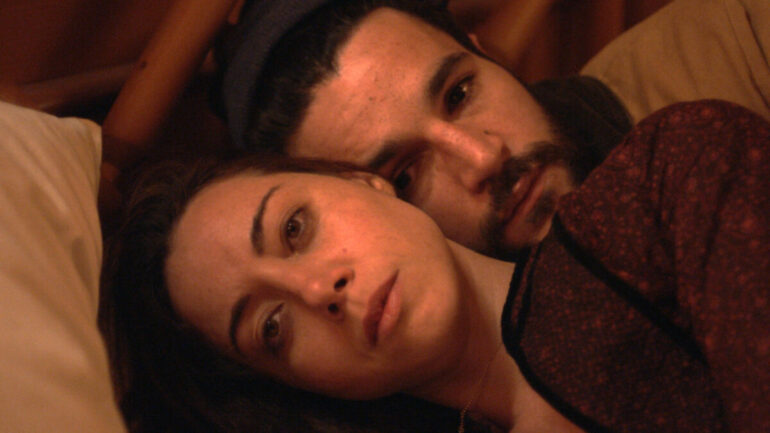Black Bear is a psychological drama from the mind of Lawrence Michael Levine, and is his sixth film as director. The story leads the viewer through a two-part act marked with deep human emotion, key recurring themes, and a plot that reflects the complexity of a filmmaker’s mind.
Filled with conflicting feelings of her profession after directing a few films, actress-turned-filmmaker Allison (Aubrey Plaza) decides to take a trip to a cabin retreat hosted by couple Gabe (Christopher Abbott) and Blair (Sarah Gadon). In many ways, Allison hopes to gain some insight from the naturalistic scenery and decide her next pivotal steps as a film director. However, as Allison gets intimately acquainted with Gabe and Blair, and the trio begins to share deep secrets of their lives, everything is not as it seems. Soon, the sleepy, cozy atmosphere of the cabin on the lake becomes a hostel of conflict and disorder among the group.
What is most interesting here is how the plot displays each character’s struggles, both individually and among the group. Upon first encountering the characters, the audience is shown how Allison, Gabe, and Blair interact with each other and slowly form a camaraderie. Eventually, the three open up to each other and all of their personal issues are laid out on the table.
Alison is having doubts about her ability as a filmmaker and wonders if giving up her role is the right choice. Meanwhile, Gabe and Blair have been together for a few years, yet every discussion they have turns into a fight, especially when it comes to feminism and the historical role of women in the family. All of the questioning, sarcasm, and arguments between the group finally hit a boiling point, and the audience sees a reflection of pained individuals struggling to find a sense of identity.
Levine presents a solid authenticity to his characters and these personalities easily draw the viewer into the plot. Even more exciting, though, is that the second act of the film completely turns this initial picture of the characters’ struggle upside-down and alters what the viewer was shown in the first act. This new viewpoint will likely confuse the viewer when it happens, but Levine’s structuring of the film later clarifies what is happening by the end credits. Nevertheless, if you like conflict-filled dramas with twists and turns that leave you wanting more, Black Bear has a great story to follow.
This level of intricate detail is also shown in the story’s scenery, music, and cinematography. Focusing on Allison in particular, there is a recurring shot where she is on a deck outside of the cabin and looking out into the expanse of nature. This one scene is probably the most powerful in the film as it describes her character in a number of ways by the end scene. Much of the film’s background also takes on a darker tone, as most scenes occur at night and there is not much sun to be seen. Even the surrounding forest is quiet, forlorn, and devoid of emotion, only featuring a random black bear that is hidden and never reveals himself much except through growls or a knocked over trash can.
Furthermore, some scenes are slightly long and drawn out to exhibit more emotion from characters and to have more time for dialogue. This slower pace may bore some viewers in between plot points, but the pace isn’t so jarring that it hurts the storytelling, especially in light of the better-paced second act. Finally, the music does a wonderful job at complimenting the overall somber tone and tense scenes throughout.
The acting in the film is quite good, as well. Aubrey Plaza does a phenomenal job as Allison, playing a complex character full of sarcasm, wit, and emotion. The role is a multi-layered personality that is fascinating to examine and is a nice change of pace compared to Plaza’s more exuberant roles. Christopher Abbott is also exceptional, playing well off of Plaza’s dialogue as Gabe and helping her to produce some of the most memorable scenes in the film. Meanwhile, Sarah Gadon’s character is largely linear and saddled between Plaza and Abbott most of the time. Her presence isn’t as passionate or heartfelt as the other two, but she contributes well to the narrative, although casting someone else for her part may have improved the film’s impact.
Black Bear shows that inside each of us resides a quandary that we must face and overcome, and this complex human story by Lawrence Michael Levine shows that struggle in spades and detail.
READ NEXT: 10 Best Psychological Thriller Movies You Should Watch
Some of the coverage you find on Cultured Vultures contains affiliate links, which provide us with small commissions based on purchases made from visiting our site. We cover gaming news, movie reviews, wrestling and much more.




